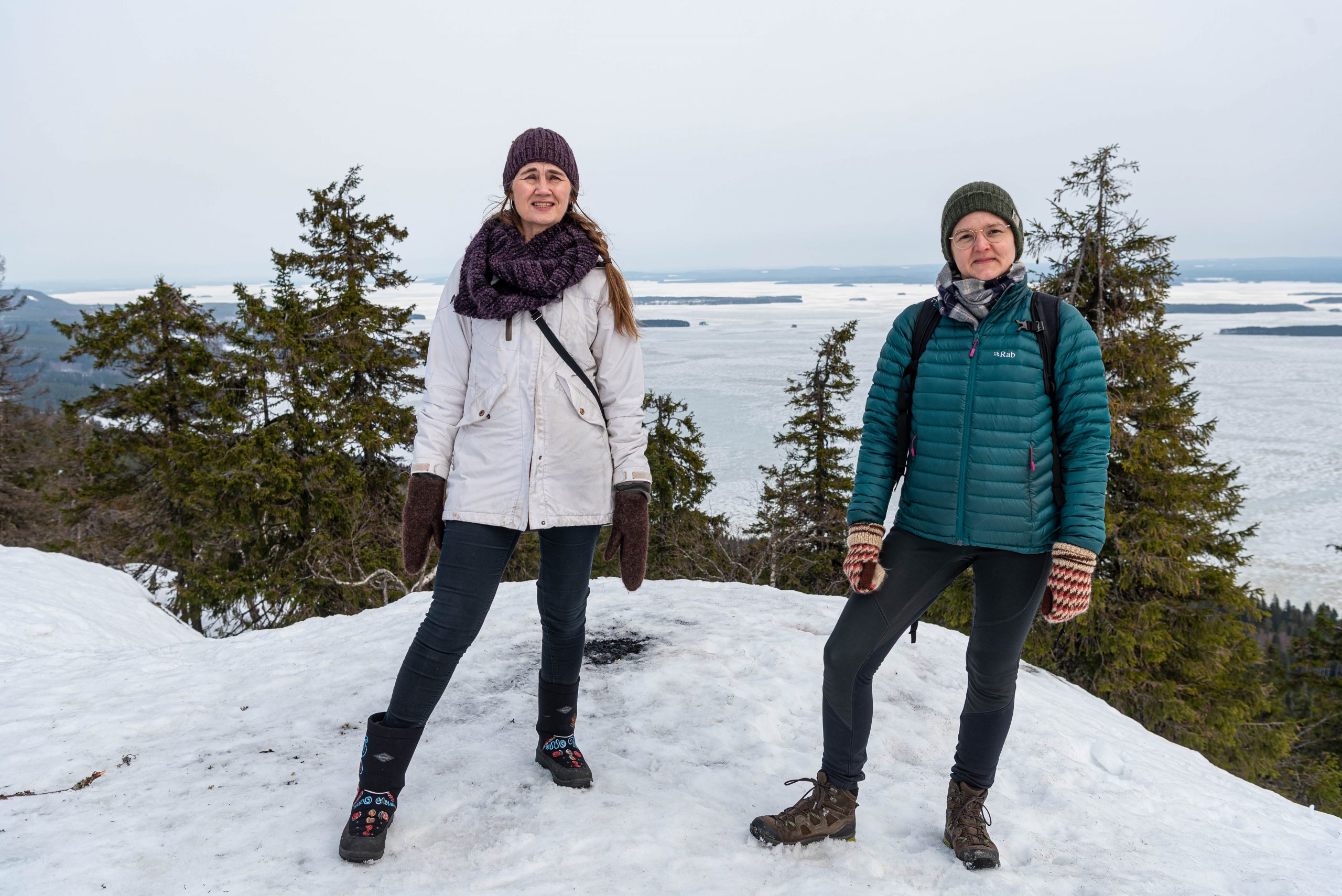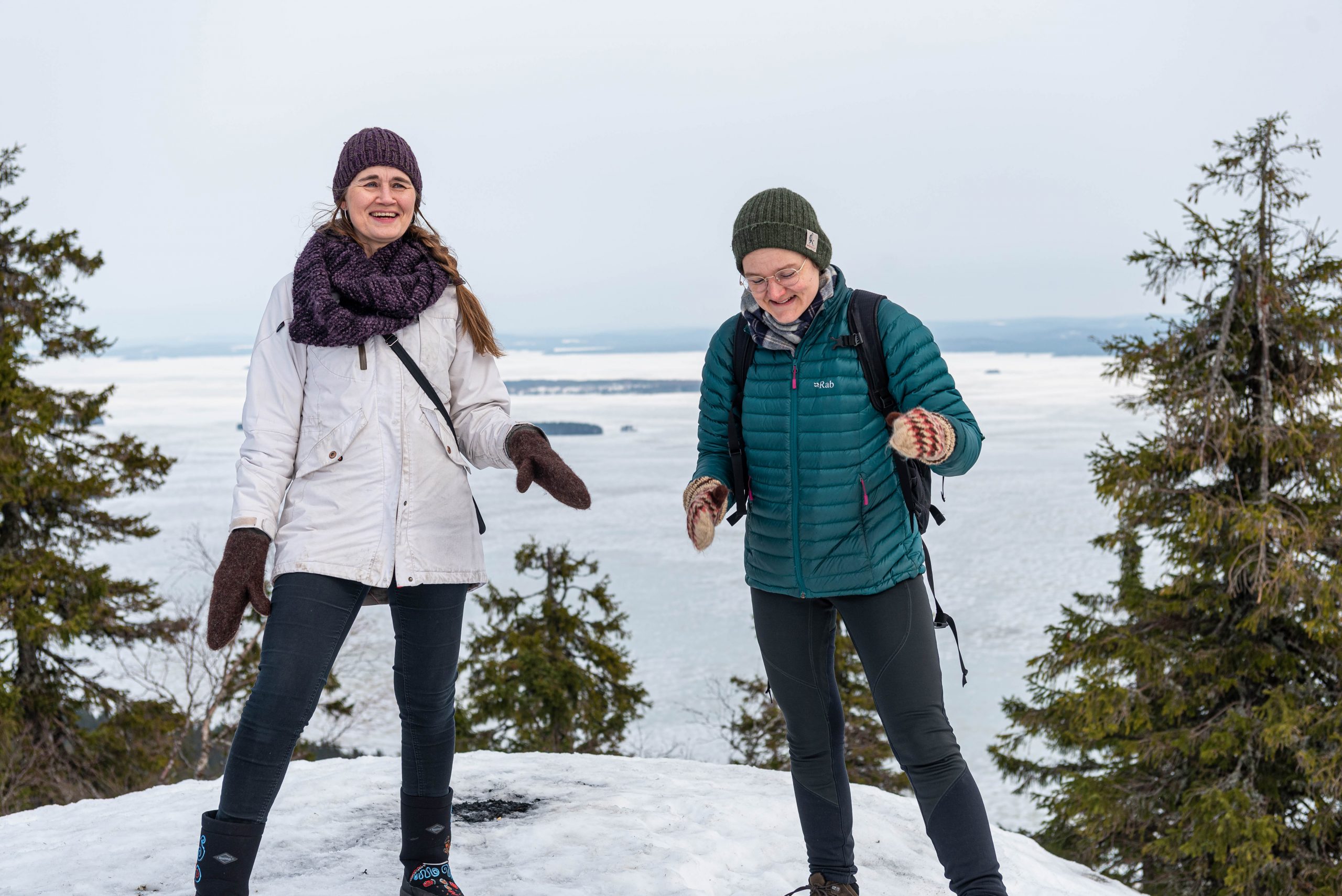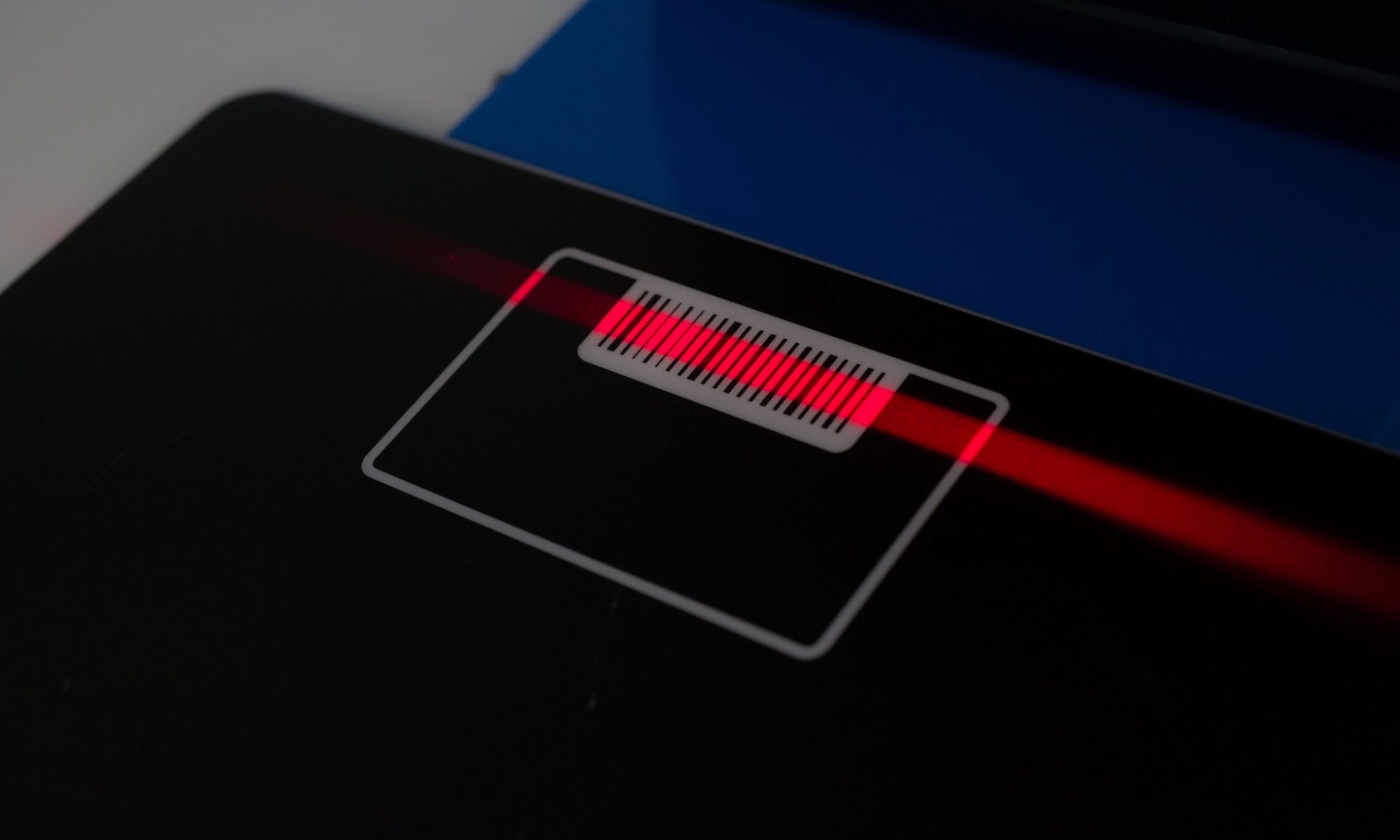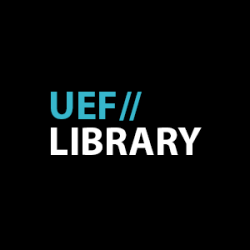(Please, scroll down to read in English)
Aloitimme helmikuun 2021 alusta projektisuunnittelijoina datatuen palveluiden kehittämishankkeessa. Hanke on kirjaston opetus- ja tietopalveluiden koordinoima. Olemme molemmat tutkijataustaisia ja edustamme eri tieteenaloja, mikä palvelee hankkeen tavoitteita: Itä-Suomen monialaisessa yliopistossa tarvitaan osaamista ja ymmärrystä erilaisten tutkimusaineistojen hallinnan palvelutarpeista, ja datanhallinnan palvelua halutaan kehittää tutkijalähtöisesti. Esittelemme ensin itsemme ja kerromme sitten hieman enemmän hankkeesta, sen tavoitteista ja alkumetreistä.
Manna Satama: historian tutkimusta ja aineistonhallintaa
Olen Manna Satama, taustaltani antiikintutkija ja pian myös asiakirjahallinnon ja arkistotoimen maisteri. Opiskelin Helsingin yliopistossa kreikan kieltä ja kirjallisuutta ja erikoistuin papyrologiaan, minkä ansiosta pääsin osallistumaan myös Jordanian Petrasta löytyneiden hiiltyneiden papyrusten konservointiin ja julkaisemiseen. Väitöskirjani käsitteli ammattitanssijoiden sosiaalista asemaa roomalaisajan Egyptissä.
Tutkimusaineistojen hallinnan kysymyksiin olen viime vuosina paneutunut Itä-Suomen yliopistolle työstämässäni gradussa ja Suomen ulkomailla toimivien tiedeinstituuttien hankkeessa, jossa pohdittiin pienten tutkimusorganisaatioiden keinoja vastata avoimen tieteen ja tutkimuksen tavoitteisiin tutkimusaineistojen osalta. Joulukuussa 2020 päättynyt hanke toi selvästi esiin tutkijoiden näkökulman tärkeyden, kun tutkimusaineistojen hallinnan ratkaisuja ja palveluita kehitetään.
Olen eräänlainen paluumuuttaja. Synnyin Kesälahdella, kasvoin Parikkalassa, muutin opiskelemaan Helsinkiin, jossa muutamaa Ateenan-vuotta lukuun ottamatta asuin vuoteen 2017. Tuolloin päätimme perheen kanssa palata Itä-Suomeen ja päädyimme Etelä-Karjalan ja Kainuun kompromissina Joensuuhun. Viime vuosina olen löytänyt lenkkiseuraksi äänikirjat. Haaveilen myös paluusta vuosiksi tauolle jääneen tanssiharrastuksen pariin.
Niina Nurmi: kenttäbiologian aineistoista laboratorioon
Olen Niina Nurmi ja lähtöisin Helsingistä. Biologian kandin opintoni päädyin tekemään Edinburghin yliopistossa vierailtuani siellä Skotlantiin suuntautuneella fossiiliekskursiolla. Kiinnostukseni eläinten käyttäytymisekologiaan vei minut Skotlannista vuodeksi kenttätöihin Etiopiaan, missä keräsin pitkäaikaista seuranta-aineistoa Guassan tselada-apinoista. Suoritettuani Helsingin yliopistossa maisterin tutkinnon, muutin Saksaan tekemään tohtorin tutkintoani Göttingenin yliopistoon. Väitöskirjaani varten keräsin tutkimusaineistoa Kongon demokraattisessa tasavallassa luonnonvaraisten bonobojen käyttäytymisestä ja hormonitasoista ravinnonhankinnan kontekstissa.
Ennen Itä-Suomen yliopistoon siirtymistäni työskentelin Helsingin yliopistossa tutkimuksen tuen tehtävissä. Töideni osana avustin tutkimuseläinten kasvattamisessa ja laboratoriotöissä. Mielenkiintoni tutkimusaineistojen hallinnan tukipalveluiden kehittämistyöhön on paljolti perujaan kokemuksistani monipuolisten tutkimusaineistojen parissa sekä tutkimuksen tuen erilaisissa tehtävissä. Vapaa-ajan harrastuksiini kuuluu pyöräily ja boulderointi.

Datatuen kehittäminen osana tutkimuksen tukea
Hankkeen taustalla on yliopistoa koskeva velvoite tarjota tutkijoille riittävä tuki tutkimusaineistojen hallintaan. UEFin tutkijoille tehdyissä kyselyissä ja haastatteluissa on noussut esiin selkeä palvelutarve ja tarve kehittää näitä palveluita käyttäjälähtöisesti. Palveluita kyllä on, mutta ne ovat hajallaan eri yksiköissä, eivätkä tutkijat tahdo oikein löytää palvelujen ääreen. Hankkeen tavoitteena onkin kehittää perusta toimivalle, moniammattilaista osaamista tarvitsevalle ja hyödyntävälle datatuelle. Vuoden mittaisessa projektissa ei kaikkea laiteta kuntoon mutta päästään hyvään alkuun: Uudelleen muotoillut datatuen palvelut käynnistetään, niitä testataan ja niistä viestitään, jotta tutkijat osaavat hyödyntää yliopiston tarjoamaa tutkimusdatan hallinnan asiantuntemusta ja tutkimuksen tukea ylipäätään. Hanke koskee koko yliopistoa, mutta kirjaston koordinaatiorooli on siinä keskeinen.
Aloitimme tehokkaalla perehdyttämisellä ja tutustumisella työyhteisöön Joensuun kampuskirjastolla. Korona ja kirjaston remontti luonnollisesti asettavat omia rajoituksiaan työyhteisöön sujahtamiselle – kerkesimme käymään viihtyisältä vaikuttaneessa taukotilassa vain kerran. Etätyö sopii tähän hankkeeseen kuitenkin mainiosti, koska emme osallistu esimerkiksi kirjaston asiakastyöhön lainkaan. Työhuone meillä on Joensuun kampuskirjaston 3. kerroksessa, josta on näköala sisäpihalle.
Kehittämishankkeen projektisuunnittelijoina teemme läheistä yhteistyötä projektin vetäjän, Anne Karhapään, ja hankkeen hallinnollisen johtajan, palvelupäällikkö Katri Rintamäen, kanssa. Katri toimii myös hankkeen ohjausryhmän puheenjohtajana. Tämän lisäksi hankkeen taustalla operoi verkosto toimijoita, jotka tuottavat palvelua ja tietotaitoa datanhallinnan tukeen. Projektisuunnittelijoina rooliamme voisi kuvata myös verkoston toimijoiden yhteistyön fasilitoijina. Olemme osallistuneet eräänlaisina ulkopuolisina tarkkailijoina esimerkiksi aineistonhallintasuunnitelmien kommentointityöhön osallistuvien yksiköiden tapaamiseen. Kansallisia ja kansainvälisiä ratkaisuja ja keskustelua olemme seuranneet webinaareissa, joihin on helppo osallistua etätyöpisteeltä käsin.
UEFin datatuen palveluja halutaan kehittää nykyistä käyttäjälähtöisemmiksi palvelumuotoilun keinoin. Vaikka konkreettisia tapoja tai ratkaisuja ei tietenkään ole tässä vaiheessa vielä esittää, olemme pitäneet tätä näkökulmaa tietoisesti esillä hankkeen ohjausryhmän ja laajemman verkoston tapaamisissa. Jatkossa pääsemme perehtymään palvelumuotoilun menetelmien konkretiaan henkilöstökoulutuksessa, jota voidaan tarjota laajemminkin kirjaston henkilökunnalle.
Projektin sisältöön olemme nyt alkuvaiheessa paneutuneet mm. haastattelemalla datatuen verkostoon kuuluvia henkilöitä. Haastattelujen pohjalta rakennamme kuvaa datatuen palveluista ja niiden taustalla olevista resursseista. Haastattelut toimivat meille itsellemme myös perehdytyksenä kirjastoon ja koko yliopistoon.

Starting in February 2021, we began our work as planners in a data support services development project. The project is coordinated by the teaching and information services of the library. Our background is in research and we represent different disciplines. This serves the goals of the project: as a multidisciplinary university, UEF requires skills and understanding of the service needs of different types of research data, with an emphasis on developing the services from the perspective of the researcher. We will begin with a brief introduction of whom we are, followed by a description of the development project, its main goals and initial steps.
Manna Satama: historical research and archival studies
I am Manna Satama and originally come from Parikkala, from the border between North and South Karelia. I moved to Helsinki to study and lived there until 2017 apart from a few years spent in Athens, Greece. Then we decided to return to Eastern Finland and ended up in Joensuu as a compromise between South Karelia and Kainuu.
My academic background is in classical studies. I got my PhD in ancient Greek language and literature in the University of Helsinki where I was fortunate to be involved in papyrology. That took me to Amman, Jordan, for a short period as well, to work with carbonized papyrus documents found in Petra. In my doctoral dissertation on professional dancers in Roman Egypt, I combined papyrology, ancient Greek language and social history with my personal interest in dance.
I’ll soon complete the Master’s degree in records management and archival studies with a thesis on research data management. Previously, I’ve been engaged in a project on research date management of the Finnish academic institutes abroad. We focused on what it takes for small, non profit private organizations to answer the requirements of open science in practice. One major issue came forth clearly , namely the importance to understand the needs of the researches when developing research data management services.
Niina Nurmi: from field data to the laboratory
I am Niina Nurmi and come from Helsinki. I ended up completing my Bachelor of Biology degree at the University of Edinburgh, following a visit there during a fossil excursion to Scotland. My interest in animal behavioural ecology lead me from Scotland to Ethiopia to collect long-term field data on the geladas of Guassa for one year. Upon completing my Master’s degree at the University of Helsinki, I moved to Germany for doctoral studies at the University of Göttingen. As part of my thesis work, I collected field data on wild bonobos in the Democratic Republic of the Congo with a focus on behaviour and hormone levels in the context of feeding.
Before I moved to the University of Eastern Finland, I worked in research support services tasks at the University of Helsinki. As part of my work, I provided assistance in maintaining and breeding research animals and worked in the laboratory. My interest in developing the support services for research data management stem from my experiences with a rich variety of research data and participating in research support tasks. During my spare time, I like to go biking or bouldering.
The development of research data services as part of research support
The project stems from the obligation of the university to offer adequate support for research data management for researchers. A clear need for data support services and the necessity to develop such services from the user’s perspective have been raised in questionnaires and during interviews conducted with the researchers at UEF. There are services available currently, but they tend to be scattered across different units and researchers do not tend to find to them. The project aims at developing the foundations for a functional data support service which relies on, and takes advantage of, multiprofessional competence. While a year-long project can’t offer a panacea, it can be a good start: the newly designed data support services will be initiated and tested, and they will be communicated in such a way that researchers know how to make the most of the data management expertise provided by the university, and of research support services in general. While the library has a central role as a coordinator, the project is relevant to the university as a whole.
In February, we began with an efficient orientation and by getting to know the work community of the library at the Joensuu campus. Naturally, the Covid-19 pandemic and the renovation of the library have limited our ability to meld seamlessly in to the work community – we had a chance to visit the cozy recreation room once. However, remote work is well suited for this project because we do not take part in daily, basic activities, such as library customer service duties. Our office is on the 3rd floor, with a window overlooking the inner court.
As project planners for the development project, we work in close collaborating with our project team leader, Anne Karhapää, and our project administrative leader, Katri Rintamäki. Katri is also the chairman of the project steering group. In addition, a network of stakeholders producing services and know-how in support of data management operates in the background of the project. Our role as project planners could also be described in terms of us functioning as facilitators of cooperation between the various stakeholders of the network. For example, by taking the role of outside observers of sorts, we have participated in a meeting between units that take part in commenting data management plans. We have followed national and international solutions and discussion through webinars, which are easy to participate in while working remote.
The approach is to develop more user-centered data support services at UEF using the methods of service design. Although we have no concrete ways or solutions to present at this early stage, we have kept this aspect consciously visible during meetings of the project steering group and the wider network. As the project advances, we will have a chance to acquaint ourselves with the methods of service design more concretely during personnel training, which can be offered to the library personnel more widely.
During the initial stages of the project, we have immersed ourselves in the content of the project, for example, by conducting interviews with people who are part of the data support network. The interviews will help us to gain a more comprehensive picture of the current data support services and their background resources. The interviews will also help us to integrate into the library and the university as a whole.
Manna Satama, datanhallinnan projektisuunnittelija | Data management project planner
Niina Nurmi, datanhallinnan projektisuunnittelija | Data management project planner
Tutkimuksen tuki | Research support
Opetus- ja tietopalvelut | Training and information services


